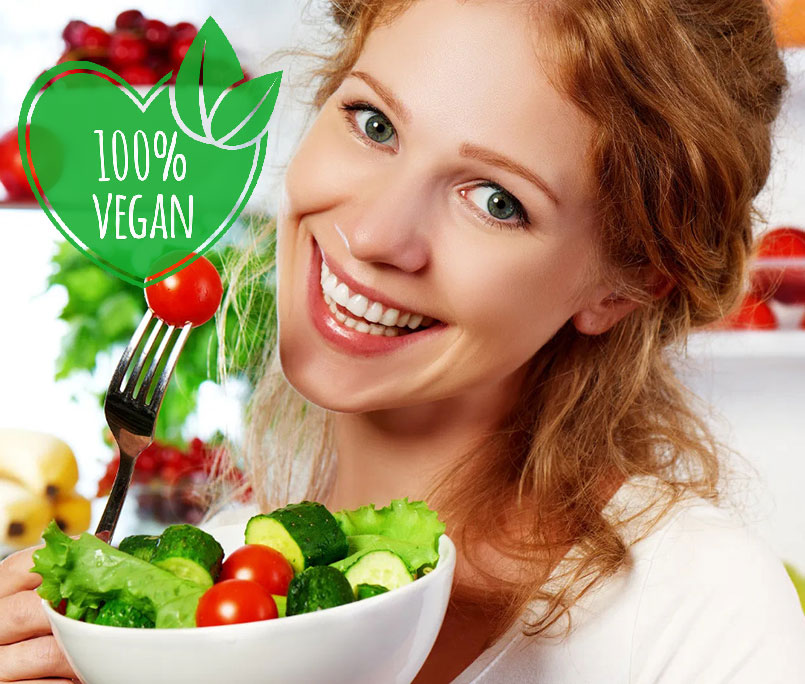What is Veganism?
Veganism, or veganism, more than just a diet, is a philosophy and lifestyle that seeks to exclude all forms of exploitation and persecution of animals for food, clothing or any other purpose.
The vegan certificate is a certificate issued by accredited organizations to products that do not contain an animal ingredient and that are proven by various conformity assessments and tests in their production that no animal is exposed to any exploitation.

Vegan individuals never consume or use an animal product. In order for vegan individuals to choose any product, the product must be XNUMX% suitable for their lifestyle. They display an extremely clear and sensitive attitude to this issue.
Vegans avoid not only consuming animal food, but all products with animal inputs. From accessories and apparel to makeup and toiletries, animal products and animal-tested products are found in more places than you expect.
Veganism is increasing around the world every year, so millions of vegan consumers are looking for plant-based vegan products that are vegan certified. Vegans are strict about being vegan in all everyday use products, not just food and drink. These products are cosmetics, clean products, detergents, textile products, furniture, etc. It includes everything necessary in a human life like.
Compared to other consumer groups, vegan and vegetarian consumers are much more conscious and research the ingredients of each product. When the buyers are sure that the product complies with vegan standards, they prefer that product. However, most of the products are not transparent about the type of production, where the resources are obtained, whether there is a situation that does not comply with vegan standards in the supply chain, and because there is no mechanism that controls these standards, the vegan consumer prefers vegan certified products with vegan labels.
Veganism is the philosophy and way of life that avoids practically all forms of exploitation and cruelty to which animals are subjected for food, clothing or other purposes, and further supports the development and use of non-animal-use alternatives for the benefit of humans, animals and the environment.
Having a vegan certificate for a product ensures that the vegan consumer can trust that product. In this way, the manufacturer creates a more reliable brand perception and becomes the first choice for the consumer. The vegan certified product does not only target a vegan consumer, even if it is not vegan, it is preferred by every conscious consumer who cares about nature, ecosystem, living life and sustainability. Today, many consumers, even if they are not vegan, prefer products with vegan certification.

Apply Now
Veganism, or veganism, more than just a diet, is a philosophy and lifestyle that seeks to exclude all forms of exploitation and persecution of animals for food, clothing or any other purpose.
To explain very fundamentally, vegetarianism is to adopt a diet that does not contain animal food, to act consciously on issues such as the sanctity of living life and the sustainability of nature.
Vegetarian diets vary based on the foods they contain and exclude. Vegetarian diet types are; Lacto-vegetarian, Ovo-vegetarian, Lacto-ovo, Pescatary and Vegan
Vegan diets only involve eating directly plants (such as vegetables, grains, nuts and fruits) or foods made from plants. As it is known, vegans never consume meat, nor do they eat foods from animals such as dairy products and eggs.
Vegan diets only involve eating directly plants (such as vegetables, grains, nuts and fruits) or foods made from plants. As it is known, vegans never consume meat, nor do they eat foods from animals such as dairy products and eggs.
Many vegans avoid eating honey because commercial honey farming can harm the health of bees. The main function of honey is to provide bees with carbohydrates and other essential nutrients such as amino acids, antioxidants and natural antibiotics.
The vegan certification process can take from 1 week to 8 weeks, depending on the production conditions of the product. It all depends on the components, processes, suppliers and how well the suppliers communicate and how quickly the V-Mark expert team responds to their demands.
V-Mark vegan vegetarian certified products can use the V-Mark vegan vegetarian logo on their packaging, so vegan consumers around the world can get the product they buy with confidence and confidence.
Vegan Vegetarian Certificate ensures that the vegan or vegetarian consumer can safely select products suitable for their lifestyle at a glance. Therefore, it can be used for any product that can be proved by various tests and conformity audits and that we can encounter in our daily life.
Vegan diets only involve eating directly plants (such as vegetables, grains, nuts and fruits) or foods made from plants. As it is known, vegans never consume meat, nor do they eat foods from animals such as dairy products and eggs.
Vegan diets are known to help people lose weight. However, they also offer a number of additional health benefits. For example, a vegan diet can help protect your heart.
Everyone's metabolism is different, and different diets may produce different results for each person. However, there are many notable health benefits of maintaining vegetarian and vegan diets.
The vegan certificate is a certificate issued by accredited organizations to products that do not contain an animal ingredient and that are proven by various conformity assessments and tests in their production that no animal is exposed to any exploitation.
Vegan shoes are shoes that do not harm any animals and are made without using animal products in any way. It also excludes products tested on animals. This does not include many of the materials traditionally used in shoe making, such as leather, wool, fur, and some adhesives.
Vegan cosmetics defines cosmetic products produced by the fact that any product produced in the cosmetic industry does not contain any animal ingredients and no animals are used for testing.
Unfortunately, it is very difficult to be sure whether the product is vegan unless there is a vegan symbol certified by an accredited and fully independent organization such as the V-Mark. The most logical thing to do is to reach out directly to the manufacturing companies and ask; however, there is no certainty that you will get an honest answer.